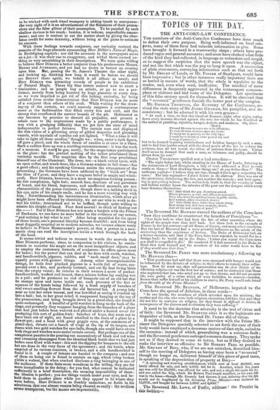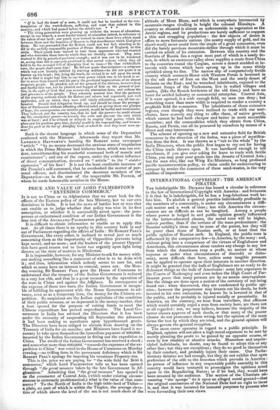TOPICS OF THE DAY.
THE ANTI-CORN-LAW CONFERENCE.
THE members of the Anti-Corn-law Conference have done much to defeat their own purpose. Being well-informed on local sub- jects, many of them have had valuable information to give. Some have brought it forward in a trustworthy shape ; others have pro- duced vague and general accounts ; and more have clothed what little of the kind they had collected, in language so redundant and turgid, as to suggest the suspicion that the mere speech was the object, and not the fact which was the peg to hang it upon. A succession of plain statements, conveying information such as that set forth by Mr. BRIGHT of Leeds, or Mr. FOSTER of Stockport, would have been impressive ; but in other instances really important facts are so buried in masses of words, that the whole is repulsive to the reader, and, even when read, ineffective. The mischief of mere diffuseness is frequently aggravated by the extravagant common- place or violence and bad taste of the Delegates. Let specimens of this false oratory speak for themselves. It will be observed that the "reverend" gentlemen furnish the better part of the samples. Mr. GEORGE TuomrsoN, the Secretary of the Conference, re- vived the stale story of Sir JAMES GRAHAM, his pamphlet, and in- consistency ; but he adorned it with his own graces- " At such a time, we find this identical Baronet, night after night, voting down every measure directed, against the very law which he has described as the author of gambling, injustice, hunger, despair, and madness. Oh, Sir- . Had it Pleased Heaven to curse me with affliction ; To rain all sorts of sores upou my bead: To steep me in poverty to the very lips; I could hate found in some part of my soul A drop of patience:' but to be doomed to pining wretchedness and helpless hunger by such a man, and to find him besides armed with the dread power of the law to enforce his sentence, does all but banish the virtue of patience from the heart. Virtue itself seems to demand that such a man, so infamous and guilty, should be driven from his seat."
Orator THOMPSON spoiled not a bad anecdote— "The night before last, whilst standing in the House of Lords, listening to the statements of Lord Brougham, a lady of rank addressed a Peer in such words as these—' How shocking these things are! do you believe them ? "fhe nobleman replied-6I believe they are true, though I don't agree respecting the cause.' The lady rejoined—' I don't believe in the distress.' Here was one of the aristocracy disbelieving the fact, and another the remedy ; and both agree- ing in postponing redress. The melancholy truth is, that the votaries of rank and fashion neither know the miseries of the poor nor the dangers which every hour threaten themselves:
•
Oh! little think the gay, licentious proud. Whom pleasure. {tower, and affluence surround; They who their thoughtless hours in giddy mirth. And wanton, often cruel riot. waste:
Ak ! little think they, while they dance along. How many feel, this very moment, death. And all the sad variety of pain!'"
The Reverend Mr. HAWKES warned the authors of the Corn-laws "how they continue to counteract the benefits of Providence "— "Let them look to what had been the fate of other countries, where the rights of the people were thus held back. Let them look to the example of France in the last century—of old Rome, of Greece, and many other countries. But the lust of Mammon had a more powerful influence on the minds of the aristocracy than the experience of history. The Duke of Richmond had, on a former occasion, said that if the Corn-laws were repealed, he would flee to a foreign land : he would say to the Duke, Unless you repeal the Corn-laws you shall be compelled toffee.' Ile wondered if it had occurred to the Duke to think that both himself and the members of his order would have to flee if they would save their lives."
The Reverend Dr. PERRY was more revolutionary ; following up Mr. HAWKES thus- " That gentleman had said that those were oppressed with hunger would not be influenced by the dictates of religion in their efforts to remedy their suffer- ings. Now he must say, that self-preservation was the first dictate of the Christian religion—it was the first law of nature; and he contended that those who neglected that law, who acted not up to that dictate, and did not preserve life, were guilty of a crime which all were forbidden to commit—murder. Sooner than suffer himself or his children to starve, Dr. Perry would take bread from the table of the Prime Minister."
The Reverend Mr. STANTON, of Melbourne, imputed to the Corn-laws the spread of Atheism, in these words- " In one family, the members of which attended upon his ministry, the mother and the son, who were both religious characters, told him that now they did not like to converse on religion, tor they found it 4fficult to believe, in consequence of the distress and destitution they were suffering."
It used to be the doctrine that adversity is the test of virtue and of faith : the Reverend Mr. STANTON cites it as the legitimate ex- tinguisher of faith, as the Reverend Dr. PERRY did of virtue.
. It might be supposed that in the interview with the Prime Mi- nister the Delegates specially selected to set forth the case of their body would have employed a decorous matter-of-fact style, suited to the occasion : instead of which, generalizing was a common fault ; and the Reverend gentlemen outraged common decency. They spoke not as if they desired to come to terms but as if they desired to make the interview as offensive to Sir li011EBT PEEL as possible. Mr. GRUNDY of Bury, who, if we are not mistaken, described him- self to the meeting of Delegates as having once been a "reverend" though no longer so, delivered himself of this piece of good taste, in speaking of the depreciation of property at Bury- " A spinning and weaving establishment, which cost at least 40,0001., was lately offered. for sale, and only 4,000/. bid for it. Another, which five years ago was sold for 23,0001., was offered for sale, and not a single bid made for it; and one called the Gig, which Sir Robert Peel would recollect, as his own life was in the lease—though Mr. Grundy had thrown it out, believing that his life would not be lengthened by his becoming Prime 34'144er—was declared at 15,0001., and bought for between 5,000/. and e„0004".
ihis fThaii The ReverendMr. Low?, of For(hr, ?Adresse the Pee,reitZ "If he had the heart of a man, it could not but be touched at the con- templation of the wretchedness, suffering, and want that existed in this country, and which had passed before the mind's eye. * * * " The rising generation were growing up without the means of education, except in one branch, a most fearful branch of education indeed, in reference to the rulers of our land : our youth were trained to curse those laws which stood between them and the bounties of Heaven in that munificence which God gives them. He was persuaded that Sir Robert could not but feel, standing as he did in the awfully-responsible position of Prime Minister of England, at this crisis. Their youth were trained to hate those oppressors who had enacted and who maintain these laws by which they are literally starved. They were trained to this by practical parental example; and it was not to be wondered at, seeing that this is expressly predicted in that sacred volume which they all hold to be the revealed will of Almighty God to man—' He that withholdeth corn, the people shall curse Lim.' He did not quote that scripture—a scripture which was now literally fulfilled by starving millions—he did not quote it to barrow up his heart; but, being the truth, he wi-hed it to tell upon his mind, if so be that it might lead him to use that power which was in his hand in or- der to avert from himself and his party the predicted imprecations of an almost desperate people. He pleaded, not on the ground of the distress, however deep and fearful that was, but be pleaded and begged of him on the ground of jos- tice, in the sight of God, that you remove the starvation-laws, and redress the just grievances of the people. They solemnly assured him that the patience of the starving millions which Sir Robert and others had repeatedly and well applauded, and on which they were still vainly calculating, was all but ex- hausted. Should that delegation break up, and should he cause the proroga- tion of Parliament without affording efficient relief, or giving them one glimpse of hope, the consequences, ere months passed, would be fearful and tremendous. They believed, and the country too, that he bad the power—he could almost say the omnipotent power—to remedy the evils and prevent the ruin which was at hand ; and if he refused or delayed to employ that power, which his place and his position gave him, fearful would be his responsibility, and tremen- dous Ms guilt at the bar of Almighty God, at which he and they must soon ap-
wean"
Such is the decent language in which some of the Deputation conferred with the Minister. Afterwards they report that Mr. LAWRENCE HEYWORTH'S banding Sir ROBERT some newspaper "article" "by no means decreased the anxious state of trepidation in which the Prime Minister had hitherto been, which was too evi- dent, notwithstanding his wonderful command both of muscle and countenance"; and one of the organs, under the evident influence of direct communication, devoted an " article " to the "sinister expression" of his face! It is not the least creditable instance of the Premier's self-command, that he overlooked the matter of per- sonal offence, and discriminated the decorous members of the Deputation—as in the case of the respectable Mr. FOSTER, of whom he made honourable mention in the House.

























 Previous page
Previous page